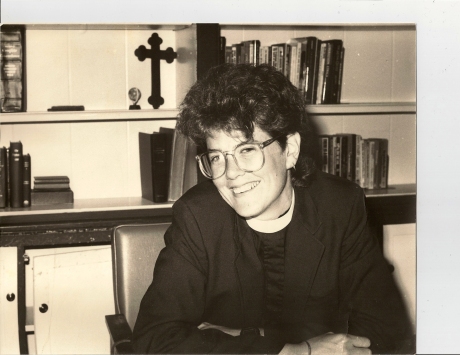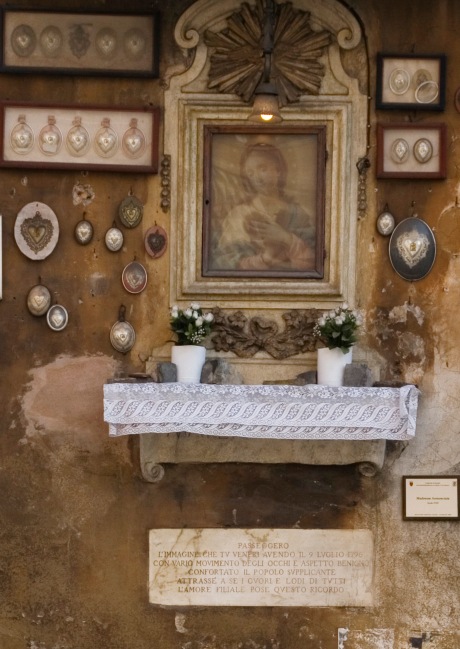
In the year of 1969, when Richard Nixon was President and Neil Armstrong walked on the moon, when spring was interrupted by the peace march on Washington and summer welcomed the music of Woodstock, in the year that Sesame Street debuted and the first Wal-Mart opened, I sat in a classroom with fifty other adolescents watching the movie Let My People Go, a documentary about the Holocaust and the founding of Israel. At the end of the film, a young rabbi tried to elicit responses from a stunned and silent class of usually loud and obnoxious ninth graders. I’ll never forget the moment when he looked at me, the only kid with a non-Jewish parent, and said: “Tracey, you could have passed. What would you have done? Would you have died for your faith or denied it?” I didn’t have an answer. I didn’t know what it meant to live or die for one’s faith. I didn’t really know what my faith was. So I just stared back at him and finally said, “I don’t know.”
That accusatory statement, “You could have passed,” followed by the probing question, “What would you have done?” has haunted me all the days of my life. It has permeated my dreams and kept me awake at night. It has stood with me in the pulpit, and has influenced every major life decision I have made. And just when I think I have put the accusation to rest and answered the question, it re-emerges as a beast from the deep recesses of the ocean called my unconscious. It is the angel with whom I wrestle causing me to walk with a limp. It is the burning bush in front of which I stand barefooted. It remains the blinding flash of light that knocks me off my feet and forces me to my knees when I try to run away.
I think of myself as half-Jewish and half-Christian, and I consider my rich interfaith heritage a mixed blessing. It has always drawn me from the center to the edge of organized religion – especially Christianity and Judaism. And yet, even as a child, I wanted to be a clergy person. I just wasn’t sure whether I should be a rabbi or a minister.
I have always loved being in the house of God, and I am equally at home in both church and synagogue. As a youngster, I also liked pretending that I was a preacher. I can still remember setting up the chairs in our family room, placing my stuffed toys and dolls in straight rows, putting on my robe, and preaching to the silent and complacent congregation of inanimate worshippers. At bedtime, I said (and to this day I still say) both the Schema, passed on to me by my Jewish grandmother, and the Lord’s Prayer, taught to me by my Christian mother. And, from both sets of parents and grandparents, as well as rabbis and priests, religious school teachers and youth group leaders, I learned to live by the Great Commandment: love God with all your heart, soul and might, and love your neighbor as yourself.
Growing up, I often felt like the young boy in The Life of Pi. He had a deep curiosity about God and religion. After exploring various religions in his native India he concluded: “Hindus, in their capacity for love, are indeed hairless Christians, just as Muslims, in the way they see God in everything, are bearded Hindus, and Christians, in their devotion to God, are hat wearing Muslims.” At the insistence of the priest and the imam that he had to choose one religion, Pi responded, “All religions are true, I just want to love God.” And so it was for me. I found truth in both Judaism and Christianity, and I just wanted to love and serve God.
By the time I was in ninth grade, I was attending daily chapel at school, Saturday worship at the Reform Jewish synagogue, and Sunday worship at the Episcopal Church. No wonder I couldn’t answer The Question asked by the rabbi that day. I could see more similarities between the Reform Judaism and Episcopal Church of my youth than I could find differences. After all, both religions worshipped God, prayed with a book, read from the Bible, sang beautiful music, lit candles, shared bread and wine, worked for justice, and taught a message of faith, hope, and love. As Paul wrote in his letter to the church in Corinth, when it came to religion, “I saw in a mirror dimly and knew only in part.”
In my mid-twenties, I felt pushed, pulled and prodded by the Spirit to the Union Theological Seminary, a divinity school in the middle of New York City where diversity, interfaith respect, spiritual rigor, and academic inquiry was (and is still) highly valued. My first semester in seminary could be likened to a non-stop wrestling match with God. Exhausted from taking on someone bigger and stronger than me, I found myself walking down 42nd Street one day asking God to let me go. And then it happened.
A voice called out to me from within me saying, “I’m not going to let go of you.” I went into a McDonald’s restaurant, ordered my usual cheeseburger-fries-and coke, and began frantically scribbling down a conversation with this voice from nowhere. The voice called me by name, confronted me with my own issues and private wounds, answered lots of questions, called me to my vocation, and reassured me when I protested.
As I’ve shared from the pulpit on more than one occasion, when I pleaded for more clarity, the voice said, “I was Jesus on earth, but I’m still God, and I’m here with you now.” Though I didn’t comprehend it fully, it was a Trinitarian statement to which I could give my heart. When I questioned why the voice was talking with me, I heard, “Because you’ve been asking for it.”
It was true. I had been asking, begging, even challenging God to be clear with me, to help me answer the question asked by the rabbi. And here I was – on a cold January afternoon, sitting in a McDonald’s Restaurant on 42nd Street in Manhattan, having this private conversation with a voice.
At the end of our time together, I asked, “If you’re inside of me, then how can you be God?” The voice replied in words I will never forget, “I’m inside of anyone and everyone who wants to know me. And, if the world would hear and follow me, my kingdom would come.”
With that comment, the conversation ended. I got up and walked home in quiet amazement, wondering if I had really spoken with almighty God. Like Mary, I kept silent and treasured these words, pondering them in my heart.
A few days later, one of my professors, the late Dorothee Soelle, told our class that faith is a two-way street: it is both a gift from God and our decision to accept the gift. I didn’t know if I had talked with God, but in a letter to a friend I wrote, “If I don’t accept the voice of God on faith now, I don’t think I’ll ever get a more direct message.”
While struggling to make sense of that afternoon conversation in a McDonald’s, I have been faithful to the voice for nearly thirty years. And while it’s led me down some complicated paths and strenuous journeys, as this evening’s reading from the Gospel of Matthew suggests, throughout my ministry, I have encountered God come to earth, sometimes in faces, stories, and disguises that I have found disturbing and threatening.
After my McDonald’s conversation, I claimed Jesus as my way, my truth and my life in God, and the Episcopal Church as my spiritual home. In Jesus, I experience the unconditional love that God has for each and every one of us, especially those who aren’t sure where they fit in the great scheme of things. In the Episcopal Church, I discovered a lively religious tradition committed to proclaiming in word and action God’s justice, love and mercy for all creation. I also found an inclusive community of faith that embraced me, received my gifts and talents, and welcomed my questions of faith and reason. Along the way, I fell in love with our rich heritage of common prayer, the beauty of Anglican music, the grandeur of cathedral architecture, the mystery of the Eucharist, the expansive and yet intimate nature of our worldwide communion, and the power of faithful witness in the public square. Over the years, I have come to appreciate our church’s ability to deal with ambiguity, volatility, messiness, complexity, uncertainty, and change.
When I graduated from seminary and was about to be ordained a deacon, my bishop and hero Paul Moore told me: “All you have to do is love them, really love them. That’s all you have to do.” That’s been the best and most challenging advice I ever received. I am profoundly grateful for the love I have been able to give as an Episcopal priest, and more importantly, for the love I have received, much of which is present in this cathedral tonight.
Twenty-five years is a long time. But then again, it seems like just yesterday that I learned to recite the ancient words of the Schema and the Lord’s Prayer. It seems like just last week that I opened the Bible for the first time, and began to talk with the God who knit me together in my mother’s womb and will be with me even beyond the day I die.
Yes, I’m still wrestling with God, but I’m also struggling to sing with angels. And, though I still “see in a mirror dimly…and know only in part,” this much I truly believe. God searches us out to know us and to love us. God discerns our thoughts from afar and takes them to heart. God traces our journeys and our resting-places, and is acquainted with all our ways. Indeed, there is not a word on any of our lips, that God does not know. For the voice of God is inside of anyone and everyone who wants hear it. And, if humankind would hear and follow that voice, and strive to be the eyes and ears, hands and feet, voice and heart of the Holy One, God’s reign of peace on earth would truly come. It has been my calling and my vocation to invite (and maybe, push, pull and prod) those whom I encounter along the way to listen, really listen, to that voice inside of each of us, and then follow where it will lead. For this sacred task, I am profoundly humbled, honored and grateful.
Tracey Lind, December 12, 2012



